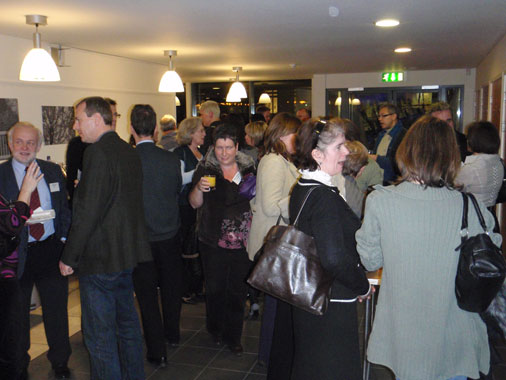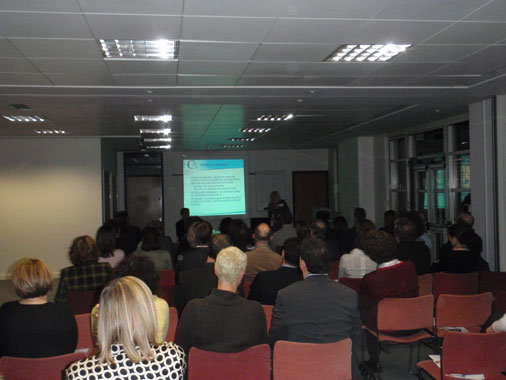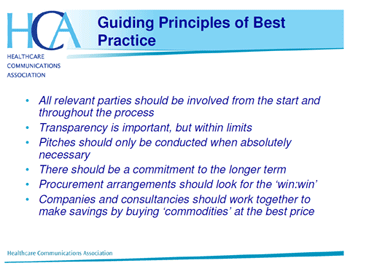|
MORE DETAILS
|
EVENING BRIEFING - 26 NOV 2008 - OXFORD
|
Procurement of MedComms services: Facing up to the Challenges.
This was a very illuminating and, dare I say, thought-provoking meeting for many of us. Like it or not change is coming very fast. Whilst that will bring with it a lot of form filling and maybe some pain for many people, the emphasis of the presentations from both speakers was on how everyone should be aiming for a win:win partnership. It is not simply about cutting costs, but it is about optimizing value and working together more efficiently.
A summary of the meeting is published here below
To make sure you're included in announcements about future events just email Peter Llewellyn, if you haven't already done so, to register your interest.
Julia Cook of the Healthcare Communications Association (HCA) explained some background to the organization and the work of the Procurement Consultation Group which she Chairs. Julia presented top line data from the latest 2007/08 benchmarking survey which will be reported in full soon. [Download Julia's presentation here]
The following background documents are also available to download:
HCA Consultancy or Commodity Report: A discussion document based on findings from the 2006-7 HCA benchmarking programme [PDF - Download here]
Consultancy or Commodity? Special HCA Members Debate Proceedings of the meeting held on 28th November 2007 [PDF - Download here]
Guiding Principles of Best Practice for Selecting and Working with Communications Consultancies. Based on a round table consultation meeting held on 6th March 2008 [PDF - Download here]
Richard Woodford, Marketing Procurement Category Manager, Global Procurement - EMEA, Merck Sharp & Dohme then very clearly spelt out the need to accept Procurement now as part of the process. "We're not monsters, we're not evil but we've arrived and we're not going away!" [Download Richard's presentation here]


Report written by Dominic Jack, Anthemis Consulting
You could almost sense the atmosphere beforehand – a group of agency staff with colourful stories about their past interactions with pharmaceutical procurement departments all very interested to find out what the view from the ‘other side’ was like.
The evening started with Julia Cook from the Healthcare Communications Association (HCA) who chairs their Procurement Consultation Group. As part of their annual benchmarking function undertaken over the last 6 years (agencies) and 4 years (pharma), she reported on some of the insights that they have gained.
A key challenge identified in the development of procurement has been the need to move from a situation where the information between procurement, marketing and the agency flows in only one direction to drive down costs. The ideal model is a collaborative one, where all parties work together to effect a win:win situation and costs are fairly negotiated and based on the work being commissioned. The HCA have developed a number of guiding principles to help achieve this goal.

Julia presented a number of perhaps surprising findings from their latest survey, which benchmarked current practices versus the guiding principles: 70% of companies involve procurement before a pitch; 90% said they would be willing to appoint an agency without a pitch; 40% of agencies had been involved in pitches with 6 or more competing agencies, but only 20% of pharma respondents monitored their own time in pitches.
With the latest situation with the current relationship set out, it was Richard Woodford’s task to set out a road map to improving that relationship.
Richard started bravely by asking for people’s experience of Procurement: had they found it rewarding/had they hated it? Perhaps the hated it experiences were predictable, but some in the audience had found the experience very useful; for example, in helping with Procurement of services for the agency.
Richard then characterised where some of the problems with Procurement in Pharma have arisen. He pointed out that most of the experience in Procurement is with Direct Procurement –the purchasing of simple commodities. In contrast, Indirect Procurement – the purchasing of complex services that might vary in terms of quality, time to complete or client-agency relationship – is quite different. He suggested that a lot of Pharma Procurement is still biased towards Direct Procurement.
After trying to convince us that Procurement staff are not all evil, he tried to convince us of the process-driven ability of Procurement to work across brands within the same company and the insight that this position could bring. He also introduced us to the idea of Magic and Logic. This vision is that Procurement should not impinge on the creativity of agencies (the Magic) whilst at the same time requiring agencies to be able to interact with the project and financial management of the client company (the Logic). There was a plea that maybe Agencies needed to be more business-like in their dealings with Procurement, but a also a recognition that marketing clients themselves also needed to be more business-like in their dealing with the Agency. However, the statement that ‘90% of the Agency management focus on the Magic’ was challenged – most of the audience seemed to think that Agency management focus was on the Logic.
There was a lot of emphasis given to the need for communication between Agencies and Procurement and for that to occur in a timely manner. To communicate when a client phones to say ‘Could you just do so and so…’ without realising what that might entail; to communicate when invoices were unpaid; to communicate to get decisions made.
Richard was generous with his time to answer questions after his talk. He impressed on us that Procurement do not influence preferred supplier lists and expressed his hope that Procurement departments will not be recommending Agencies simply on cost. He stressed the potential for Procurement departments to help Agencies deliver value within their own organisations.
In all, a very interesting evening and, perhaps, a glimpse of the future. A few colourful stories were aired, but by no means all negative.
|
|
|

